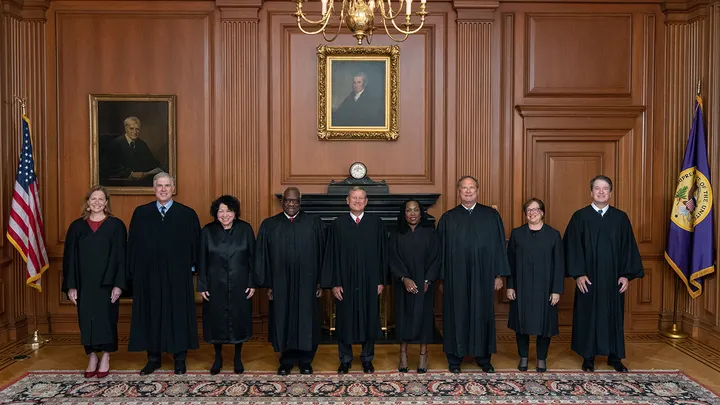
In a highly anticipated decision, the Supreme Court recently ruled in favor of the Biden administration’s immigration policies, causing a stir among Republicans and conservatives. The court’s 8-1 decision in U.S. v Texas concluded that Republican-led states lacked standing to challenge the narrowing of Immigration and Customs Enforcement (ICE) priorities for arrests and deportations of illegal immigrants.
Justice Brett Kavanaugh, writing the majority opinion, made it clear that the states’ lawsuit was unprecedented and lacked any legal precedent to support their claims. He stated, “The States have brought an extraordinarily unusual lawsuit.
They want a federal court to order the Executive Branch to alter its arrest policies so as to make more arrests. Federal courts have not traditionally entertained that kind of lawsuit; indeed, the States cite no precedent for a lawsuit like this.”
However, Justice Samuel Alito dissented from the majority, expressing his disagreement with the decision. Despite his dissent, the ruling stands as a significant victory for the Biden administration’s immigration agenda.
The case revolved around the Department of Homeland Security’s (DHS) issuance of new enforcement guidelines, which aimed to streamline ICE operations and focus on three specific categories of illegal immigrants: recent border crossers, threats to public safety, and national security risks.
DHS Secretary Alejandro Mayorkas justified the policy shift, stating that enforcement actions should not solely be based on an individual’s noncitizen status, but rather on genuine threats to public safety and national security.
While the Biden administration contends that these new guidelines optimize the use of limited resources and ensure a more targeted approach, critics argue that the policy signifies a broader rollback of immigration enforcement and weakens border security.
They point to the sharp decline in ICE deportations since the implementation of the new priorities, suggesting that it has created a sense of leniency and potential risks for the American people.
The legal challenge came from Texas and Louisiana, who claimed that the guidelines violated the Administrative Procedure Act and would burden their states with increased law enforcement costs and strain social services due to the influx of illegal immigration.
Despite a district court ruling in favor of the states, the Supreme Court ultimately determined that they did not have standing to pursue the lawsuit.
While the ruling in U.S. v Texas marks a significant victory for the Biden administration, it is important to note that this decision does not put an end to the immigration debates and challenges that lie ahead.
The court is likely to face further immigration-related cases, including challenges to the Title 42 public health order and the controversial “Parole with Conditions” policy, which has raised concerns about the release of migrants without court dates.
The ruling has divided opinions among Republicans and conservatives. Critics argue that it undermines the rule of law and reinforces concerns about the Biden administration’s approach to immigration. They view the decision as a setback for strong border security and effective immigration enforcement.
On the other hand, proponents of the ruling, including Democrats, applaud it as a step towards a more compassionate and targeted immigration policy, focused on public safety and national security.
As the Biden administration moves forward with its immigration agenda, it will undoubtedly face ongoing challenges and scrutiny. The impact of these policies on border security, law enforcement costs, and social services remains to be seen. The ruling in U.S. v Texas has ignited a new chapter in the immigration debate, and the consequences will reverberate throughout the country for years to come.
Source Fox News

